Welcome to your ultimate guide on gothic kitchen decor! If you’re someone who loves the allure of the mysterious and dramatic, you’ve landed in the right place. Gothic decor captures a unique blend of history, art, and a touch of the macabre, and it can be an enchanting style to introduce into your kitchen. In this article, we will delve into various aspects of gothic kitchen design, share personal experiences, and provide practical tips to help you create your own darkly beautiful culinary space.
Understanding Gothic Kitchen Decor
Gothic decor has its roots in the medieval period, characterized by its ornate features, mystical elements, and a darker color palette. The kitchen, often seen as the heart of the home, can also embrace this dramatic style. Let’s explore the key features and attributes that define gothic kitchen decor.
Key Features of Gothic Design
- Color Palette: Deep, rich colors like black, burgundy, dark green, and royal purple.
- Materials: Heavy textiles, wrought iron, dark woods, and stone.
- Lighting: Dim, moody lighting with candle-like fixtures and chandeliers.
- Decorative Elements: Ornate details, such as intricate carvings, vintage mirrors, and gothic-themed art.
- Furniture: Sturdy, vintage pieces often with a distressed look.
Incorporating Gothic Elements into Your Kitchen
Now that we understand what gothic decor is all about, let’s get into how to incorporate these elements into your kitchen effectively.
1. Choosing the Right Color Scheme
Your kitchen’s color palette sets the foundation for the gothic ambiance. Consider painting walls in deep shades like charcoal gray or deep plum. Accents can be introduced through backsplash tiles or smaller decor items.
Popular Gothic Color Combinations
| Primary Color | Accent Color | Effect |
|---|---|---|
| Black | Gold | Luxurious and opulent |
| Dark Red | Cream | Warm and inviting |
| Forest Green | Bronze | Natural and earthy |
| Royal Purple | Silver | Mystical and enchanting |
2. Selecting Gothic Kitchen Furniture
Opt for vintage or antique furniture pieces that feature intricate designs or dark woods. A sturdy farmhouse table with ornate chairs can be a perfect focal point.
Pros and Cons of Vintage Furniture
| Pros | Cons |
|---|---|
| Unique and one-of-a-kind pieces | Can be expensive |
| High-quality materials | May require maintenance |
| Timeless charm | Limited availability |
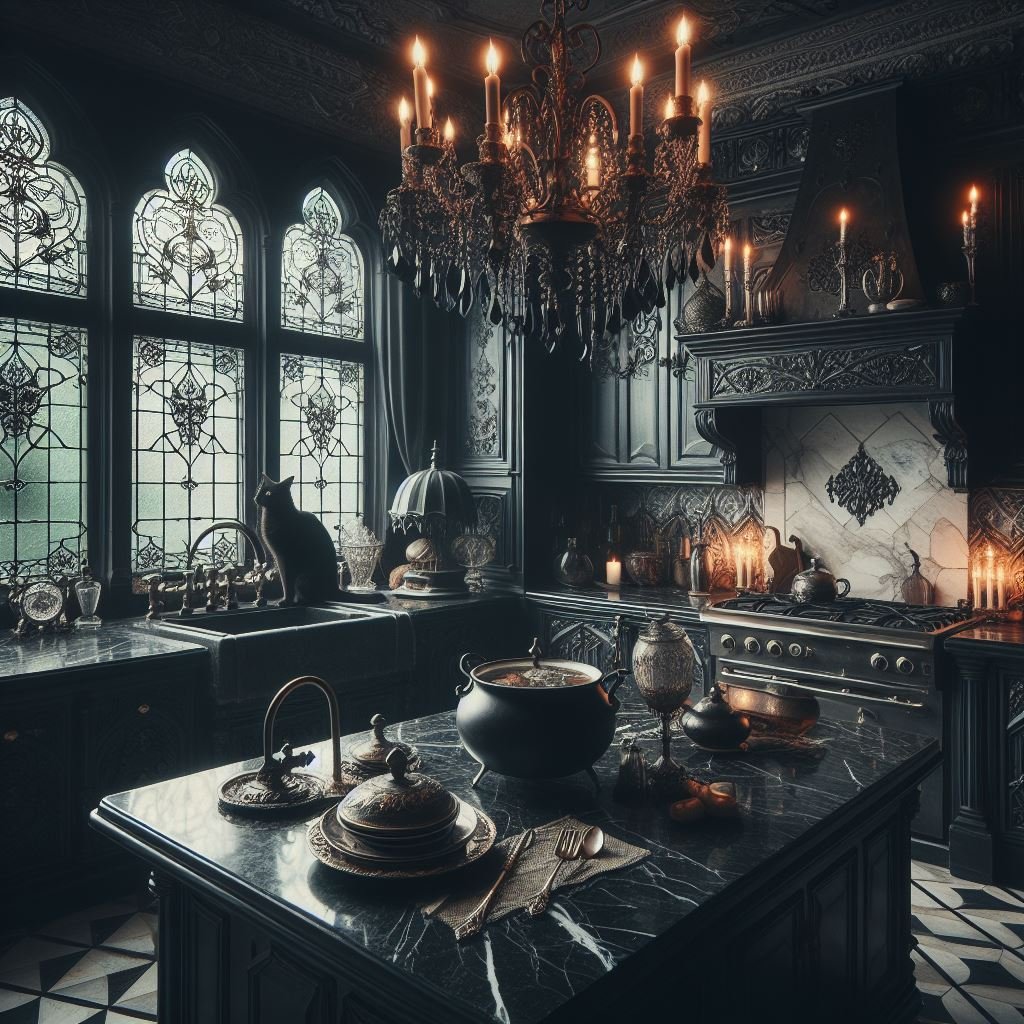
3. Lighting: Setting the Mood
Gothic kitchens often feature dramatic lighting. Look for wrought iron chandeliers or pendant lights that cast soft shadows, creating a cozy yet mysterious ambiance.
Types of Gothic Lighting Fixtures
- Candelabras: Perfect for adding a touch of romance.
- Lanterns: Vintage-style lanterns can enhance the gothic theme.
- Wall Sconces: Ideal for adding character to walls while providing soft illumination.
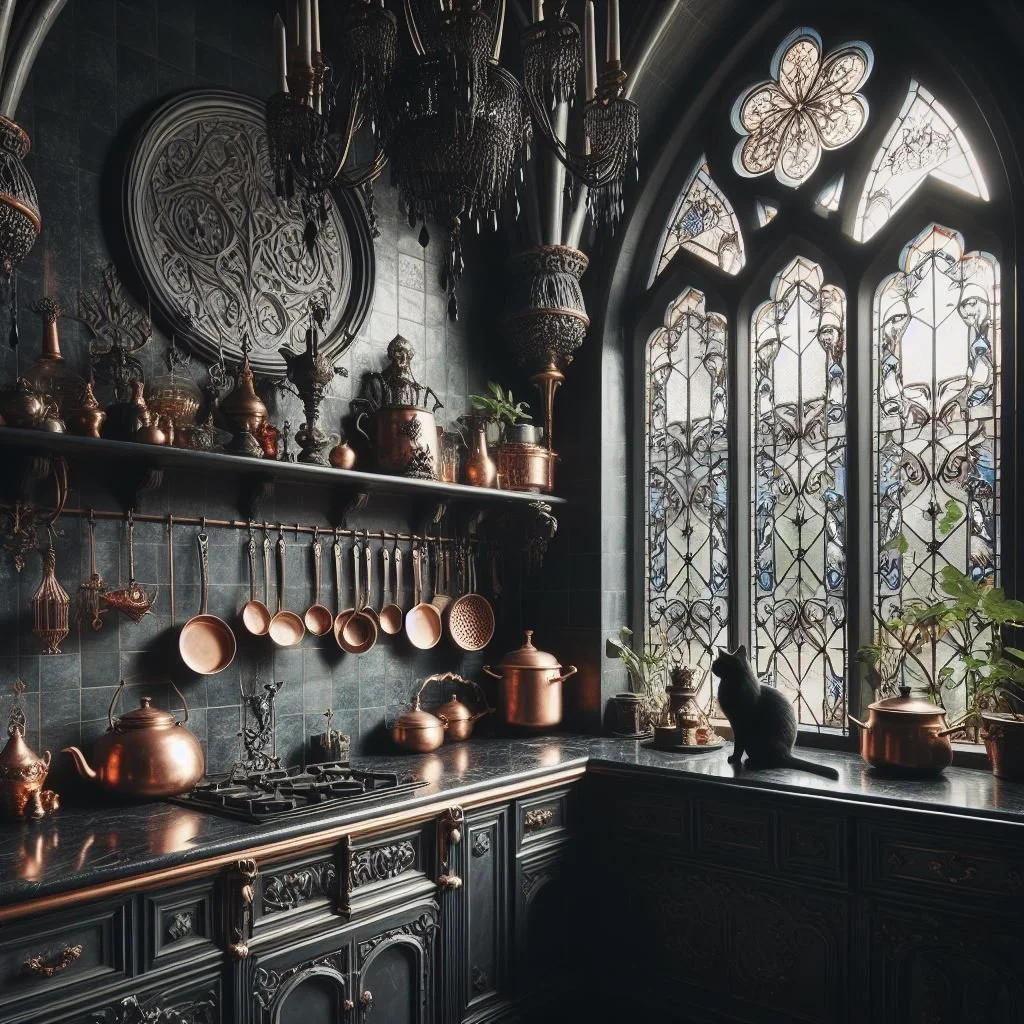
Personal Experience: My Gothic Kitchen Transformation
When I decided to revamp my kitchen into a gothic space, I was both excited and nervous. I started by painting the walls a velvety black, which instantly transformed the space. I paired this with deep red accents in the curtains and decor. One of my favorite additions was a vintage farmhouse table that I stumbled upon at a flea market; its intricate carvings became an immediate conversation starter. Lighting was a game-changer, too! A stunning chandelier I found online truly made the kitchen feel like it belonged in a castle. It was both enchanting and functional.
Accessorizing Your Gothic Kitchen
Accessories play a crucial role in tying your gothic kitchen together. Think about incorporating the following elements:
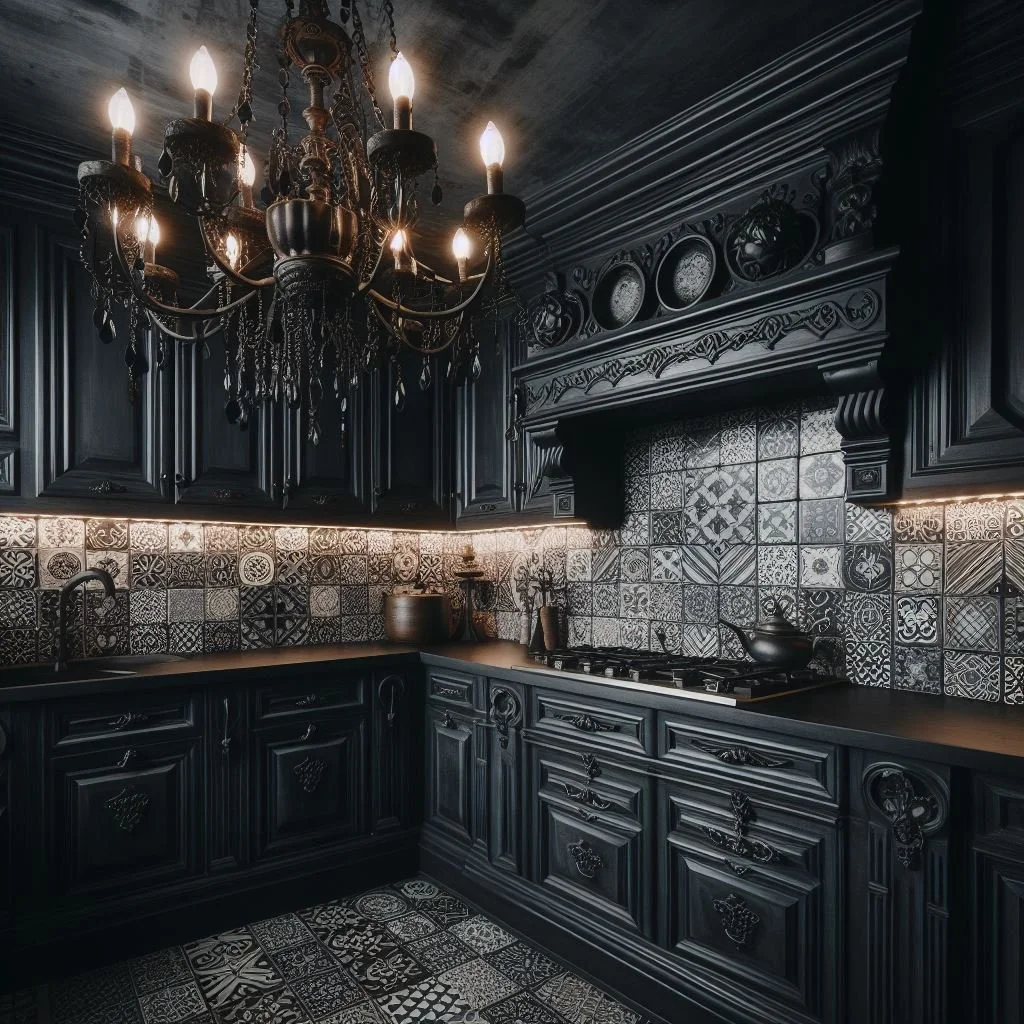
1. Wall Art and Decor
Choose artwork that reflects gothic themes, such as vintage portraits, dark landscapes, or abstract pieces with moody colors.
2. Textiles
Rich fabrics like velvet for curtains, and table runners can enhance the dramatic effect. Look for deep colors and ornate patterns.
3. Kitchenware
Your kitchenware can also reflect the gothic aesthetic. Consider dark ceramic dishes, antique silverware, and even a vintage cookbook holder that matches the overall theme.

Maintaining Your Gothic Kitchen
Once you’ve created your gothic kitchen, maintaining its charm is crucial. Here are some tips to keep it looking its best:
1. Regular Cleaning
Dust frequently to prevent buildup on ornate surfaces, and use gentle cleaners on dark fabrics to maintain their color.
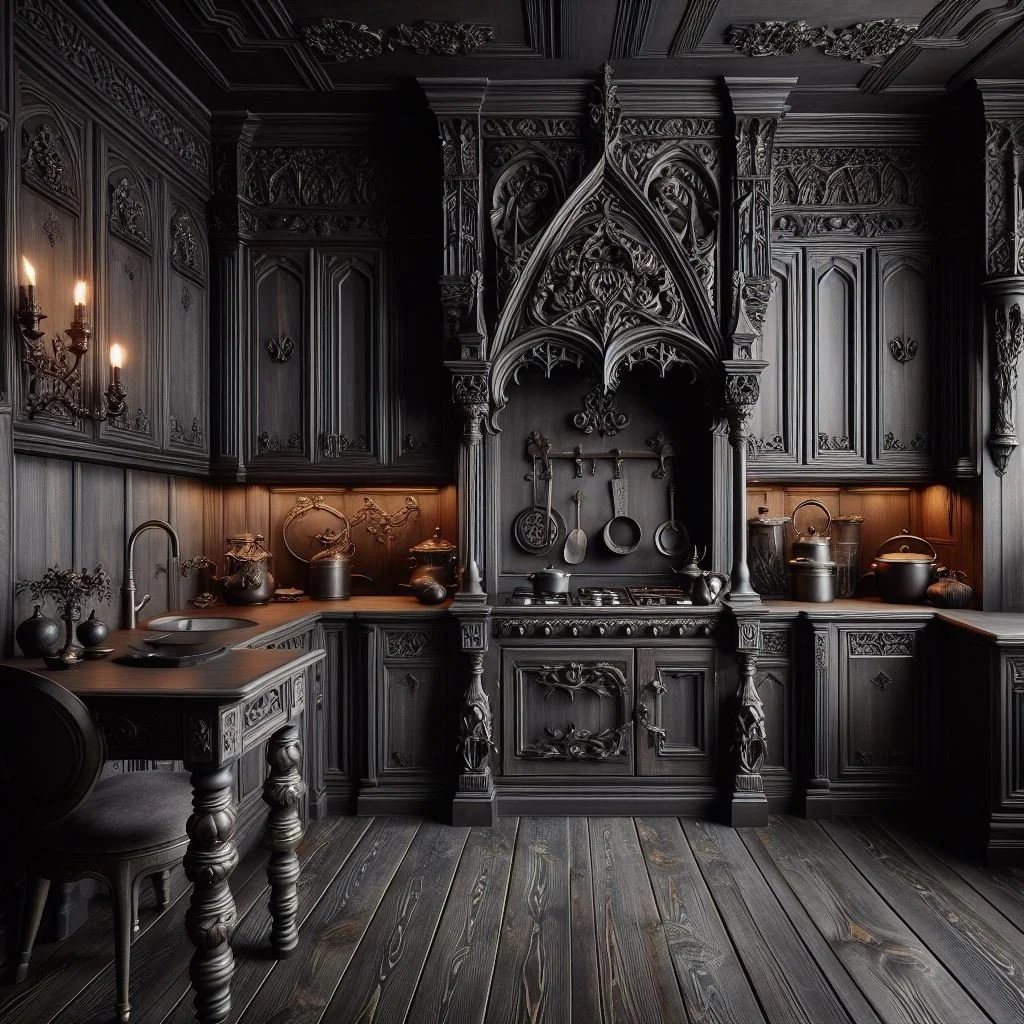
2. Seasonal Decor Changes
Consider changing accessories with the seasons; for instance, during Halloween, add more skull motifs or bat decorations.
3. Furniture Care
Ensure your vintage furniture is well-cared for by using appropriate wood cleaners and avoiding harsh chemicals.
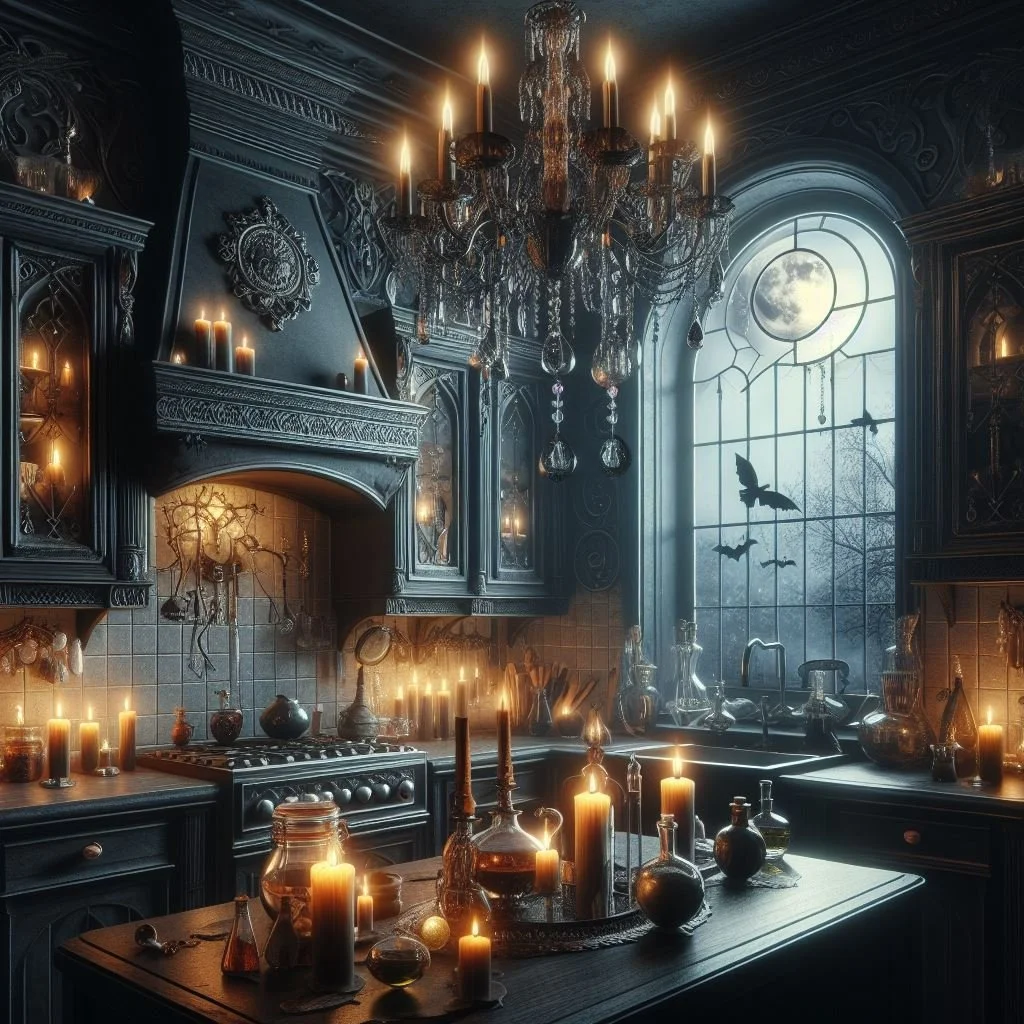
Gothic Kitchen Decor on a Budget
Creating a gothic kitchen doesn’t have to break the bank. Here are some budget-friendly tips:
1. Thrift Shopping
Visit thrift stores or flea markets for affordable vintage finds that can fit your theme.

2. DIY Projects
Get creative and repurpose old items! For example, an old ladder can become a unique shelving unit for your kitchen.
3. Paint and Reupholster
Instead of buying new furniture, consider painting or reupholstering existing pieces to suit the gothic theme.
FAQs about Gothic Kitchen Decor
What are some essential elements of gothic kitchen decor?
Essential elements include a dark color palette, vintage furniture, ornate lighting, and gothic-themed accessories.
Can I incorporate gothic decor into a modern kitchen?
Absolutely! You can blend modern and gothic styles by using gothic lighting fixtures or decor while maintaining a modern layout.
How do I choose the right lighting for my gothic kitchen?
Look for fixtures that have a dramatic presence, such as wrought iron chandeliers or pendant lights, to enhance the gothic atmosphere.
Is it difficult to maintain a gothic kitchen?
Like any decor style, it requires upkeep, but regular cleaning and some care can keep your gothic kitchen looking its best without much hassle.
What are some affordable gothic decor ideas?
Thrift shopping, DIY projects, and using paint to refresh old furniture are all great ways to create a gothic kitchen on a budget.
Conclusion
Creating a gothic kitchen decor is a mesmerizing journey that allows you to express your unique style while enjoying a space that feels both enchanting and functional. With careful attention to color, furniture, lighting, and accessories, your kitchen can transform into a darkly beautiful haven. Embrace the allure of the gothic aesthetic and let your culinary adventures flourish in a setting that truly reflects your personality!